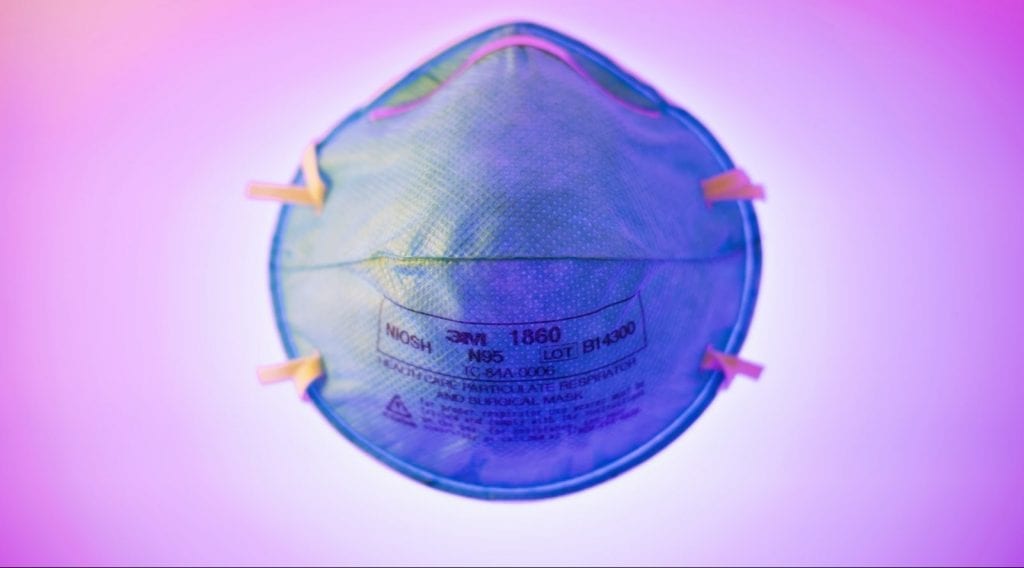Christian Dior, Chanel, Gucci, Givenchy and Prada are among some of the most well-known names temporarily pivoting away from making (some of their) high fashion garments and revenue-boosting fragrances in order to manufacture hand sanitizers and face masks, as shortages continue to plague medical professionals and other individuals across the globe. These luxury brands are not the only ones whose factories are churning out relatively out of the ordinary products in light of the continued spread of COVID-19, though. Counterfeiters are working overtime in response to the sweeping health pandemic, as well.
In response to a spike in demand for protective masks as the COVID-19 virus continues to impact individuals on a worldwide basis, claiming tens of thousands of lives in the process, “hundreds of thousands of counterfeit medical masks are being peddled,” and such fake masks are being made “in unsterile sweatshops previously used to make phony handbags or designer jeans.” According to a lengthy report from the Independent, counterfeit-manufacturers are looking to bank on rising need for surgical and high-tech respirator masks and the large-scale shortage of them by saturating the market with black market alternatives that look a whole lot like the real thing.
From manufacturing products and even packaging that bears the counterfeit trademarks of “well-known medical supply companies” like Minnesota-based conglomerate 3M to carefully mimicking the certification stamps and documents that commonly come with these goods (such as the “CE” stamp that indicates that the mask is “approved by the European Economic Area for safety, health, and environmental protection standards”), these unauthorized products look perfectly legitimate. However, recent seizures by law enforcement agencies tell a different story: the global market is rife with counterfeit masks.
The Independent’s Borzou Daragahi reports that the “fake masks may pose a threat to the wellbeing of [their wearers] because they are not made with the correct materials or in sterile environments.” Unlike their authentic counterparts, counterfeit alternatives are not being made from the National Institute for Occupational Safety and Health-approved textiles used by 3M, which are precisely what enable its respirator masks to boast a “95 percent or greater filtration efficiency” against solid and liquid particles, such as the ones that transmit the COVID-19 virus.
So, while many of these batches of counterfeit masks may be coming from factories formerly used to make fake Dior handbags or imitation Gucci sneakers, the stakes are quite a bit higher when it comes to counterfeit face masks, which is why law enforcement agencies say they are focused in cracking down on the marked proliferation of such products.
In a release dated March 11, Interpol revealed that counterfeit facemasks, substandard hand sanitizers and unauthorized antiviral medications were all seized under Operation Pangea XIII, an Interpol-led effort that saw “police, customs and health regulatory authorities from 90 countries take part in collective action against the illicit online sale of various medicines and medical products.” The Lyon, France-based organization stated that it had seized “more than 34,000 counterfeit and substandard masks,” among other products, and warned that this is merely “the tip of the iceberg for this new trend in counterfeiting.”
More recently, Turkish police seized 1 million masks and arrested five people in a raid last week on a sweatshop making unauthorized medical supplies in Istanbul, a move that comes on the heels of Chinese officials disposing of more than $1 million worth of substandard masks that had been imported from Turky, which boasts a $2 billion medical supply manufacturing sector.
All the while, U.S. Customs and Border Protection has been on high alert after its agents intercepted shipments at Los Angeles International Airport and at Chicago’s O’Hare International Airport in March containing counterfeit COVID-19 test kits, which had been shipped from the United Kingdom. Both U.S. Customs and the Federal Bureau of Investigation have issued warnings that the health care products, in particular, are at an increased potential for fraudulent activity in light of the global health pandemic.
As Jay Kennedy, an Assistant Professor of Criminal Justice at Michigan State University, wrote earlier this month, “Counterfeiters have long preyed upon consumer vulnerability in order to make a quick profit, and the current coronavirus crisis will likely be no different, except instead of the usual names – such as Louis Vuitton, Nike and Rolex – being among the hardest hit by counterfeiters, the primary targets will likely be 3M and other medical goods suppliers.














